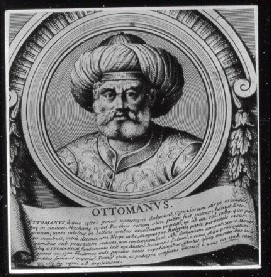 |
| A.1. | Osman Ghazi (1281-c.1320) | |||
| and the Emergence of the Ottomans: |
 |
The collapse of the Saljuq state in the second half of the C13th
led to the emergence of a number of principalities (beyliks)
in the western frontier regions of Anatolia, which continued to
propagate the Muslim Holy War against Byzantium (known as ghazi,
which was also the title given to the leader whose right it was
to wage this war). These principalities were based on
semi-nomadic Turcoman tribes, driven forcibly to Anatolia by the
Saljuqs or as refugees from Mongol conquests and oppression; they
were governed by hereditary leaders (beys) after whom the
tribe was named (eg. Osmanli = Ottoman) and who exercised
independent authority over their tribes though still effectively
ruled by the Saljuq Sultans, at that time vassals of the Mongol
Il-Khanids based in Tabriz.
Osman Ghazi, the forebear of the Ottoman dynasty, first came to prominence in a struggle with the leaders of another beylik, Kastamonu. In 1291, while there was fighting over the Saljuq throne among the Mongols of Persia at the accession of a new Khan (Gaykhatu), anarchy developed in Anatolia when the frontier Turcomans rebelled; a leader (named Ali) emerged who renounced allegiance to the Saljuqs and their Mongol overlords, and began to attack Byzantine territory. Pressures of population and the subsequent need for expansion were his possible motivation, facilitated by the decay of the Byzantine frontier-defense system. Ali was succeeded in the leadership of these raids by Osman Ghazi who began to unite the other ghazi tribes.
By 1301 Osman had advanced as far as the old Byzantine capital of Nicaea (now modern-day Iznik). He was now master of an area stretching from Eskishehir to the plains of Iznik and Bursa; anxiety was felt in Byzantium and he began to be counted amongst the most important beys of the marches, especially after Osman ambushed and destroyed a Byzantine force of 2,000 men charged with the task of relieving Iznik. Osman advanced to Bursa and was now officially recognised as a bey by the Saljuq Sultan. His fame spread to distant Muslim lands, and his territory filled with waves of immigrant Turks.